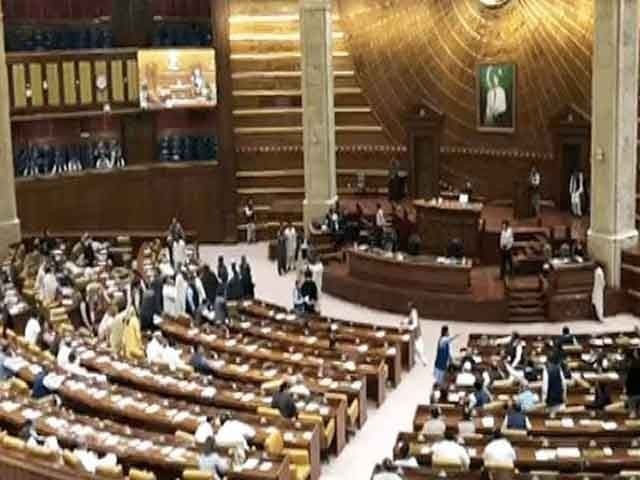
LAHORE:
The Punjab Assembly passed “The Punjab Defamation Bill, 2024” on Monday amid strong protests from the opposition, which rejected its amendments and demanded the bill be sent to a special committee to address perceived loopholes.
The opposition labelled the bill as a “draconian law” and questioned the government’s haste in passing it without consulting all stakeholders. “Passing this bill is tantamount to establishing a parallel judicial system. The public is being deprived of its right to speak… this is a black law, and the government needs to avoid it. We support stopping false news, but this defamation bill contains sections contrary to the constitution. The procedure adopted to pass this bill is not admirable as no stakeholders were consulted,” stated several opposition lawmakers.
Punjab Advocate General (AGP) Khalid Ishaq defended the bill, arguing it aims to prevent the spread of false news and to stop people from disgracing others with incorrect information. He explained that the bill requires those making allegations to provide evidence, distinguishing this from freedom of expression.
Sunni Ittehad Council (SIC) opposition leader Ahmad Khan Bhachar criticised the AGP’s stance, pointing out the lack of appointments for anti-terrorism court judges despite an existing procedure. He accused the Lahore High Court of being powerless before Chief Minister Maryam Nawaz and opposed the government’s control over the selection of judges. Bhachar urged the government to send the bill to a special committee instead of rushing it through.
Opposition lawmaker Nadeem Qureshi declared the day as the “blackest day in world history”, arguing that the government should focus on issues like formulating a wheat policy for farmers and reducing commodity prices rather than targeting the opposition.
Also read: Media bodies worry over Punjab’s defamation bill
During the heated debate, discussions frequently veered off-topic, with opposition members hurling insults at the treasury’s leadership, calling them “Dakoo and Chor” (robbers and thieves). Provincial Minister Mian Mujtaba Shujaur Rehman retaliated, calling Imran Khan a “Chor” who is in jail.
SIC’s Junaid Afzal Sahi claimed the bill was aimed at tightening control over PTI, suggesting its leaders, workers, and supporters, already targeted on May 9, would now face charges under this bill.
The opposition also demanded the house adjourn in honour of slain Iranian president Ebrahim Raisi, whom they described as a great leader of the Muslim Ummah. SIC leader Rana Aftab suggested adjourning the house would be a more fitting tribute than passing the controversial bill. However, the speaker rejected the request and continued the proceedings.
In a separate development, the Punjab Assembly unanimously passed a resolution expressing condolences for the martyrdom of Iranian president Ebrahim Raisi. Presented by Minister for Parliamentary Affairs Mian Mujtaba Shujaur Rehman, the resolution honoured Raisi’s role in strengthening relations between Iran and Pakistan and expressed deep condolences, praying for his highest place in paradise and patience for his family.
Following the completion of the agenda items, Speaker Khan prorogued the house indefinitely.
Separately, the journalist community, along with the Punjab Assembly Press Gallery, boycotted the assembly proceedings in protest as Minister Mian Mujtaba Shujaur Rehman presented the bill.
HRCP concerned over defamation bill
The Human Rights Commission of Pakistan (HRCP) has expressed serious concerns about the defamation bill passed in the Punjab Assembly.
The HRCP highlights several troubling aspects of the bill. Firstly, it proposes a parallel adjudication structure for defamation claims, which the HRCP argues violates fundamental rights and judicial norms. Secondly, the bill aims to establish defamation tribunals with judges appointed by the government, receiving higher allowances than current district judges. Thirdly, it mandates resolving defamation claims within 180 days, allowing tribunals to issue preliminary decrees of up to Rs3 million without trial, threatening freedom of expression and fair trials.
Additionally, the draft law creates a special category for high-ranking officials, whose defamation cases would be heard by a single Lahore High Court judge, undermining equality before the law.
The HRCP also criticises the bill’s rushed tabling, with only five days for consultation, deeming it insufficient for such a complex legal proposal affecting digital and media stakeholders.

